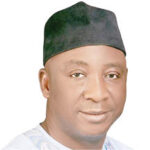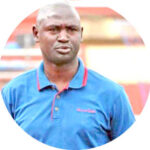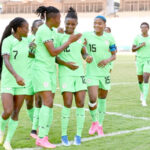The family of Chineme Martins have enlisted the support of global football players’ union Fifpro as they pursue a claim of negligence following the Nigerian footballer’s death in March.
The Nasarawa United player, 23, died of suspected cardiac arrest during a league game in Lafia, whereupon a series of on-and-off-field failures prevented him from receiving the appropriate treatment.
- Chineme Martins for burial April 18 as family rejects autopsy
- Nasarawa United explains why Chineme Martins is yet to be buried
Not only was there no working defibrillator in a stadium lacking the correct medical equipment, but the only ambulance present also failed to start.
Seven months on, Martins’ family are still seeking both financial compensation and information.
“So far, Nasarawa United FC has failed to provide the family with appropriate insurance papers and his employment contract,” Fifpro said in a statement.
It said the Nigerian Football Federation had not provided a copy of the report of its committee set up to investigate the death.
And neither NFF nor Nasarawa United had offered any support to the Martins’ family.
In response, Nasarawa United have said Martins’ contract – like many of the club’s previous contracts – did not include any insurance.
If so, this would be yet another blow for a family already devastated by the circumstances surrounding the death of Chineme, who financially supported both his mother and brother through his football, according to the BBC.
“(The family) asked questions about insurance and we don’t have any records,” club chairman Isaac Danlaadi told BBC Sport Africa.
“Even the NFF committee discovered there was no insurance for our players and that’s why they are insisting that before we start the next season, all clubs must have insurance.”
Danladi also stated that the club, which he says has financially compensated the family, does not have a copy of Martins’ contract but that local league organisers (LMC) should, as per local rules.
Compensation Package
Martins’ family want a similar payment to the one awarded to the family of Ifeanyi George, who were paid $43,000 through insurance after the Rangers International player was killed in a car crash in March.
So far, the Martins have received a total of N4m Naira ($8,600) from the Nasarawa State government, which effectively owns Nasarawa United.
While the family believe this money was to cover the cost of Martins’ burial, Danlaadi has suggested this is the entire amount the club, which has since retired the player’s number 20 jersey, will hand out.
“There is no fixed amount for compensation but because we value the player, we gave the 4m Naira – which we think is ok,” said Danlaadi.
“Giving 4m Naira is not part of the rulebook, but we did that. His death should not be used as an opportunity to squeeze the club.”
Danlaadi added that that there are no outstanding salary payments.
“His salary and match bonuses for the matches he had played were paid up to date,” he added.
“The money was paid into the player’s account, which can be checked with the bank.”
Should the N4m prove to be the final payment by the club to Martins’ family, it would be considerably smaller than the 10m Naira fine imposed on Nasarawa United for breaching a host of local league rules.
In the meantime, Fifpro’s legal team in Nigeria are exploring a claim of negligence against authorities in Nasarawa given the inadequate treatment meted out to Martins after he collapsed.
Litany of Errors

Martins, a midfielder, slumped to the floor at the end of the first half against Katsina United with no player near him whereupon a catalogue of failures followed, as BBC Sport Africa outlined in depth shortly afterwards.
Not only was there was no credible medical team within the stadium, the ambulance at the game also failed to start and, crucially, lacked a working defibrillator – as did the Lafia Township Stadium itself.
In addition, there were insufficient medical personnel at the game nor any stewards available for crowd control, prompting at least a dozen people to surround Martins on the pitch (in contravention of league rules).
“The Match Commissioner clearly displayed an act of negligence for allowing the match to start despite the obvious lapses in the arrangements for medicals, safety and security,” the NFF report into Martins’ death stated.
The report, a copy of which has been seen by BBC Sport Africa, also determined that Nasarawa United had no club doctor, physiotherapist nor crowd doctor.
In addition, the head of the medical team was revealed to be a ‘retired community health assistant, with no qualifications or experience in sports medicine and Basic Life Support/Cardiopulmonary Resuscitation (CPR)’.
With poorly-trained personnel and over-crowding, the CPR Martins received has been heavily criticised by his family.
Cause for Complaint
The NFF report into the death of Chineme Martins revealed serious misgivings about the player’s health.
The NFF report also questioned a pre-season medical assessment that certified Martins as medically fit – ‘despite red flags apparent from the history and examination’ relating to high heart rate, low blood pressure and a family history of heart issues.
“The NFF/LMC have put in place the required guidelines and regulations concerning medicals for all clubs participating in the (league) but the main problem is non-compliance by the participating clubs,” the report stated.
“This was clearly evident in the case of Nasarawa United FC.”
The NFF, which the BBC has contacted for comment, also laid the blame for Martins’ inadequate treatment on the local Nasarawa FA.
“The failure of the host FA to perform its statutory functions in the provision of adequate medical services and security during the match was largely responsible for the poor management of the medical emergency,” it said.
While the club told BBC Sport Africa that the player died in hospital, the NFF report states that he was dead on arrival at Lafia’s Dalhatu Araf Specialist Hospital.
The NFF has since sanctioned the club, struck off the match commissioner and put in place recommendations to ensure that matches in the league, currently suspended because of Covid-19, have at least two ambulances at every game.
“If at the end of the day, we have to scale down to playing league matches in only a few stadia that can provide functional ambulances and qualified medical personnel with capable referral hospitals, so be it,” NFF president Amaju Pinnick said in July.

 Join Daily Trust WhatsApp Community For Quick Access To News and Happenings Around You.
Join Daily Trust WhatsApp Community For Quick Access To News and Happenings Around You.


